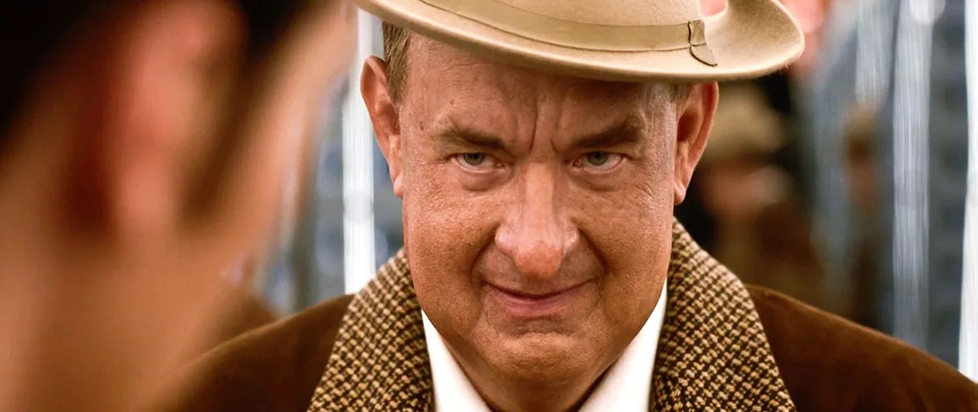
Evil as Can Be

This column is a reprint from Unwinnable Monthly #155. If you like what you see, grab the magazine for less than ten dollars, or subscribe and get all future magazines for half price.
———
Interfacing in the millennium.
———
Elvis (2022), Baz Luhrmann’s latest flashy musical extravaganza, mostly works. Austin Butler’s bravado is hampered only by the necessity that he convinces as both a gangling teenager and a bloated forty-something while looking mostly the same. Opposite him is Tom Hanks, a round peg desperately hammered into the square hole of Elvis’ life-long manager, Colonel Tom Parker.
As spectacle, the film delivers. Butler sings capably, and exudes greased-hair, popped-collar sexual charisma in a manner that somehow still manages to land in 2022. It’s colorful, fast-paced and quite funny. Like many biopics, it’s essentially a hagiography, though it gestures vaguely at evenhandedness by acknowledging Elvis’ debt to black music and giving lip service to his relationship troubles. Mostly, though, it serves as a two-odd hour reconstruction of the Elvis myth, where a beautiful young man stumbled onto the national stage, blessed us for a time, and then stumbled off. A satisfying, if well-worn, type of story.
But it’s a story that follows Western narrative conventions, so every hero needs a villain. Colonel Parker is supposed to be everything to Elvis: father, fan, manager, friend, affectionate family member who can comfort and console him and objective third party, capable of molding him as necessary to navigate his newfound fame. Next to them, the heavier descriptors pile up: exploiter, abuser, killer. A one-stop bad guy shop to match our golden boy.
Of course, Parker’s never going to come out of the narrative looking good – he was slimy in real life, and he’s slimy on-screen. It is jarring to watch the caricature Hanks makes of him when he’s opposite what ended up as a startlingly delicate Elvis, and even more so when he’s supposed to direct the structure of the film. The movie begins with a sick, withered Colonel Parker lugging his IV through a casino, speaking to the camera, exhorting us to listen to his side of the story before making judgements. It’s as serviceable a villain monologue as any, and it funnels right into three hours of Parker being, in fact, the most reprehensible human being alive. By the end of the movie, we’ve seen it all, the rise and fall, Elvis’ highs and his lows. He’s lived and died in front of us. We’ve laughed with joy and curled our lip, sympathized with the struggles and scoffed at the excesses. Colonel Parker gets to his outro, the dramatic climax – he didn’t kill Elvis! We did, with our love.

Which is bullshit, of course! The entire movie is constructed around Parker as eternal, irredeemable evil. Even Tom Hanks’ physical transformation into the role involves him hitting every American shorthand for villainy, all of them rooted in bigotry and prejudice: the fat suit, the prosthetic nose, the just-foreign-enough-to-be-suspicous accent (Parker’s real voice, apparently, sounded like a generic Midwestern American with a slight lisp). His treatment of Elvis is covetous and possessive. From the very beginning where he traps him in a mirror funhouse to make his first manager’s pitch to one later on where Elvis pushes through an adoring crowd, grabbing women by the face and kissing them, as Parker follows right behind with both hands on his waist. There’s no empathy in the presentation of his character, no desire for him to be anything other than a cartoon villain.
But there is empathy in the way Elvis’ fans are presented. The screaming teenagers, the wild gaggles of girls, mesmerized bystanders stopping to listen to the radio and disbelieving TV execs doing a double-take at their screen – them we’re supposed to understand. Why wouldn’t we? We feel the same way! And that stardom, that phenomenon that fueled his music, his movie career, his wild concerts and, later, his five-year Vegas residency and constant national touring, even as he declined, visibly and rapidly – that is presented as neutral. The movie forgets to make its own point, which is that fame is unlivable. Parker set it into motion, sure, and fed it, and profited off it, just like so many behind-the-scenes schemers before and after him, but the idea that Elvis would have been happy and healthy and long-lived if only were it not for Colonel Parker is ahistorical.
What Elvis doesn’t want to acknowledge is that, in a way, Parker was right. They let the media machine off easy; it’s so much simpler to point to specific instances of cruelty, unfairness, or mishandling in Elvis’ career than to confront the idea that there may be no way to have one without the other, that fame and frenzy of that scale cannot exist ethically.
One of the strongest sequences of the film is the first time Parker sees Elvis in person, after hearing his music playing over the radio. He hurries through the back rooms of a music venue, desperate for a glimpse of this kid he heard singing, as the camera claustrophobically follows Elvis’ shoulders and back, his face just out of sight. The first time we see him is the first time Parker sees him; it hits us like it hits him. For a moment, Parker, the public and the viewer are the same, all granted this early hint of what he would become, that first tantalizing, intoxicating taste of the man who would be Elvis.
The film depicts hour after ugly hour of Elvis’ life, a life lived in the public eye from adolescence until death, but ultimately scoffs at Parker’s assertion that, Yes, I sold him, but you bought him. It avoids complicity. How could something so beautiful be evil? Do we all not deserve to partake in his greatness? See how he sings.
———
Maddi Chilton is an internet artifact from St. Louis, Missouri. Follow her on Twitter @allpalaces.




